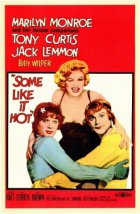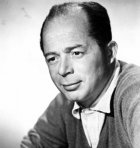
Some Like It Hot
FADE IN:
CITY AT NIGHT:
A hearse of Late Twenties vintage is proceeding at a dignified
pace along a half-deserted wintry street.
Inside the hearse, there are four somber men in black -- and
a coffin, of course, with a wreath of chrysanthemums on top.
One of the men is driving, another is in the seat beside
him. The other two are sitting in the rear of the hearse,
flanking the coffin. All four seem fully aware of the
solemnity of the occasion.
Now they hear a SIREN, faint at first, but rapidly growing
louder. The driver and the man next to him exchange a nervous
glance. The other two men move tensely toward the rear door
of the hearse, raise the black curtain over the glass panel,
and peek out cautiously.
Through the glass panel, they see a police car bearing down
on them, the red light blinking, the SIREN screaming.
The two men at the rear window gesture to the driver to step
on it. He does.
The hearse, obviously a souped-up job, instantly picks up
speed, weaves crazily through traffic, the police car in hot
pursuit. The hearse careens around a corner at eighty miles
an hour, the police car right on its tail.
By this time the policemen are leaning out of their car with
drawn guns, firing at the hearse.
The two men in the rear of the hearse, flattened against the
sides, pull a couple of sawed-off shotguns out of a hidden
overhead rack. Police bullets smash the glass panel and
whistle through the hearse. The driver and the man next to
him duck, but the hearse continues at the same breakneck
speed. The two men in back shove their guns through the
shattered glass, fire at the police car.
Despite the hail of lead, the police car -- its windshield
cobwebbed with bullet holes -- gains on the hearse.
Suddenly the car skids out of control, jumps the curb, comes
to a screeching stop. Policemen leap out, fire after the
hearse.
In the speeding hearse, the last of the police bullets thud
into the coffin. Instantly three geysers of liquid spurt
through the bullet holes. As the firing recedes, the two men
in the back put away their guns, remove the wreath from the
coffin, take the lid off. The inside is jam-packed with
bottles of booze, some of them shattered by the bullets. As
the men start to lift out the broken bottles --
SUPERIMPOSE:
CHICAGO, 1929DISSOLVE TO:
EXT. INTERSECTION OF STREETS - NIGHT
Traffic is light. All the shops are dark except one -- a
dimly lit establishment, from which drift the mournful strains
of an organ. A circumspect sign reads:
MOZARELLA'S FUNERAL PARLOR
24 Hour Service
In the window, a sample coffin is on display.
There seem to be some rites going on inside, because a number
of mourners, singly and in couples, are hurrying from the
cold, windy street into Mozarella's parlor.
Meanwhile, the hearse with the damp coffin draws up to the
delivery entrance at the side of the building. The driver
honks the horn -- one long and two short -- as the other men
step down and start to slide the coffin out. The side door
opens, and a dapper gent emerges. He wears a tight-fitting
black suit, a black fedora, and gray spats. The spats are
very important. He always wears spats. His name is SPATS
COLOMBO. He cases the street, motions the men inside. As
they carry the coffin past him, he removes his fedora, holds
it reverently over his heart. Then he follows the men in,
his head bowed.
Across the street and around the corner, three police cars
draw up silently, and about fifteen uniformed policemen and
plain-clothes men spill out. A Captain gives whispered orders,
and the men scatter and discreetly take up positions around
the funeral parlor.
Out of one of the cars steps MULLIGAN, a tough Federal Agent --
in plain clothes, of course. With him is a little weasel of
a man, shivering with cold and fear. They call him TOOTHPICK
CHARLIE for two reasons -- because his name is Charlie, and
because he has never been seen without a toothpick in his
mouth.
MULLIGAN:
(indicating funeral
parlor)
All right, Charlie -- this the joint?
TOOTHPICK CHARLIE
Yes, sir.
MULLIGAN:
And who runs it?
TOOTHPICK CHARLIE
I already told you.
MULLIGAN:
Refresh my memory.
TOOTHPICK CHARLIE
(uneasily)
Spats Colombo.
MULLIGAN:
That's very refreshing. Now what's
the password?
TOOTHPICK CHARLIE
I come to Grandma's funeral.
(he hands him a folded
piece of black crepe)
Here's your admission card.
MULLIGAN:
Thanks, Charlie.
TOOTHPICK CHARLIE
If you want a ringside table, tell
'em you're one of the pall bearers.
MULLIGAN:
Okay, Charlie.
The police captain joins Mulligan.
CAPTAIN:
We're all set. When is the kickoff?
As Mulligan consults his watch, Charlie, the toothpick working
nervously in his mouth, tugs Mulligan's sleeve.
Translation
Translate and read this script in other languages:
Select another language:
- - Select -
- 简体中文 (Chinese - Simplified)
- 繁體中文 (Chinese - Traditional)
- Español (Spanish)
- Esperanto (Esperanto)
- 日本語 (Japanese)
- Português (Portuguese)
- Deutsch (German)
- العربية (Arabic)
- Français (French)
- Русский (Russian)
- ಕನ್ನಡ (Kannada)
- 한국어 (Korean)
- עברית (Hebrew)
- Gaeilge (Irish)
- Українська (Ukrainian)
- اردو (Urdu)
- Magyar (Hungarian)
- मानक हिन्दी (Hindi)
- Indonesia (Indonesian)
- Italiano (Italian)
- தமிழ் (Tamil)
- Türkçe (Turkish)
- తెలుగు (Telugu)
- ภาษาไทย (Thai)
- Tiếng Việt (Vietnamese)
- Čeština (Czech)
- Polski (Polish)
- Bahasa Indonesia (Indonesian)
- Românește (Romanian)
- Nederlands (Dutch)
- Ελληνικά (Greek)
- Latinum (Latin)
- Svenska (Swedish)
- Dansk (Danish)
- Suomi (Finnish)
- فارسی (Persian)
- ייִדיש (Yiddish)
- հայերեն (Armenian)
- Norsk (Norwegian)
- English (English)
Citation
Use the citation below to add this screenplay to your bibliography:
Style:MLAChicagoAPA
"Some Like It Hot" Scripts.com. STANDS4 LLC, 2025. Web. 21 Feb. 2025. <https://www.scripts.com/script/some_like_it_hot_510>.







Discuss this script with the community:
Report Comment
We're doing our best to make sure our content is useful, accurate and safe.
If by any chance you spot an inappropriate comment while navigating through our website please use this form to let us know, and we'll take care of it shortly.
Attachment
You need to be logged in to favorite.
Log In